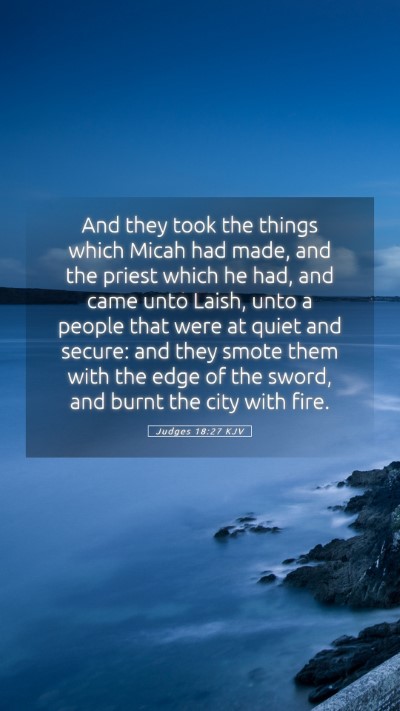Understanding Judges 18:27
Judges 18:27 states: "And they took the things which Micah had made, and the priest which he had, and came unto Laish, unto a people that were at quiet and secure: and they smote them with the edge of the sword, and burnt the city with fire." This verse describes the actions of the Danites who stole both the idols and the priest from Micah, attacking the peaceful city of Laish.
Bible Verse Meaning
This verse can be examined through various lenses of biblical exegesis and scripture analysis. The account reflects themes of theft, idolatry, and violence, prompting a deeper understanding of God’s principles of justice versus human greed.
- Theft of Sacred Items: The Danites not only seized Micah's idols but also the priest, which signifies their complete disregard for the sacredness of the items.
- Violence Against the Innocent: The people of Laish were described as secure, indicating they were unprepared for such a violent act, demonstrating the thematic contrast of justice vs. oppression.
- Idolatry: Micah's idols symbolize the corruption of true worship, as the Israelites had turned from serving the Lord to worshipping false gods.
Commentary Insights
Matthew Henry: In his commentary, Henry emphasizes the sinful nature of the Danites, who exhibited no respect for others' property or spiritual sanctity. He notes that their actions serve as a critical reminder of the consequences of leading a rebellious and idolatrous life.
Albert Barnes: Barnes provides insight into the historical context of the Danites’ struggle for territory, framing their actions as a desperate measure to secure a place in a land increasingly dominated by others. Yet, the violence employed underscores a tragic moral failure.
Adam Clarke: Clarke reflects on the implications of the peaceful setting of Laish. Its destruction illustrates a complete disregard for human life by those who should have been following divine decree. He argues that the incident exhibits the folly of idolatry as a precursor to moral decay.
Theological Reflections
This passage raises critical questions about loyalty and morality within the community of Israel. The repeated cycles of sin and societal decay underpin the history contained in Judges. For those engaging in Bible study groups or online Bible study, it's essential to recognize that such acts, while historical, reflect ongoing challenges when confronting modern spiritual practices.
Applications to Daily Life
Understanding Judges 18:27 involves applying its lessons in today’s context:
- Morality in Actions: Reflect on the means by which we pursue our goals. Are we acting justly or resorting to unethical methods?
- Value of Community: The idea of going against a peaceful society for personal gain forces us to assess how our actions impact others.
- Idolatry Today: Consider what modern idols we may be worshipping indirectly through our lifestyles or priorities over God.
Cross References
Judges 18:27 can be related to the following passages:
- Judges 17:5: Discusses Micah's stolen idols and priest.
- Deuteronomy 12:4: Warns against worshiping idols.
- 1 Samuel 15:23: Connects rebellion against God with idolatry.
Conclusion
This examination of Judges 18:27 reveals multifaceted meanings and interpretations that highlight the complexities of faith, morality, and community within the biblical narrative. Engaging with such passages through Bible study tools and Bible study guides can deepen one's scriptural understanding and enhance personal spiritual growth.


